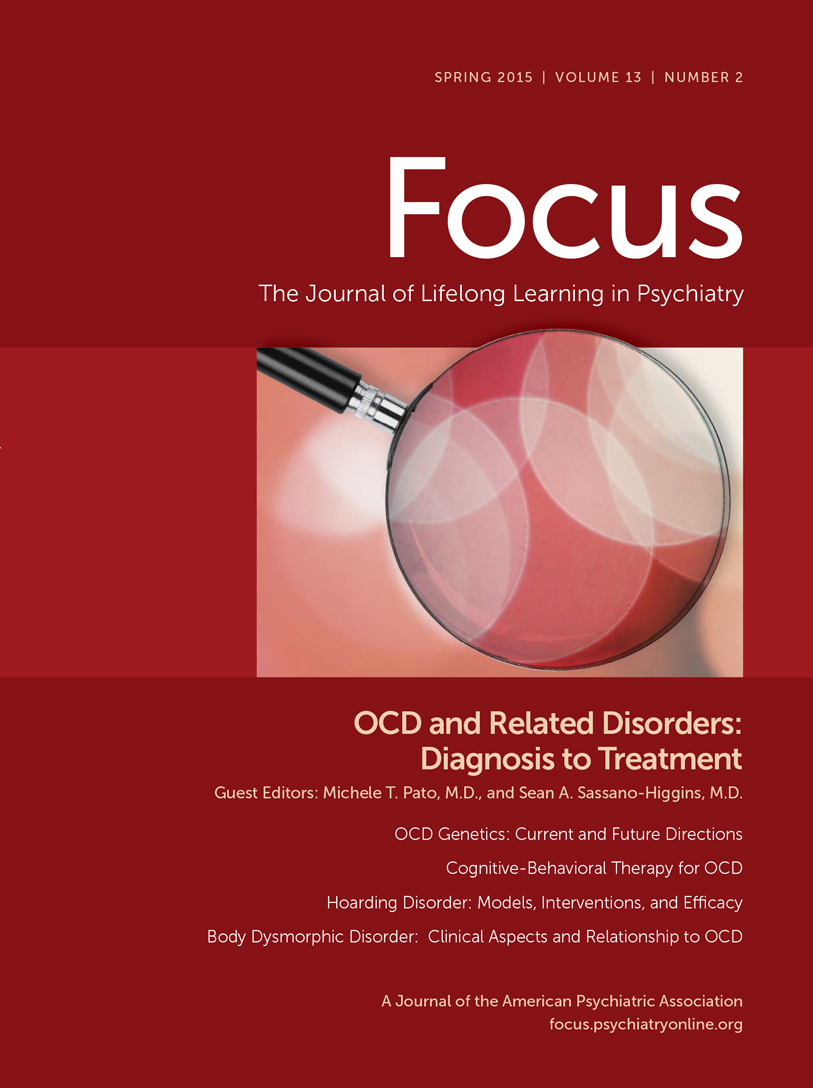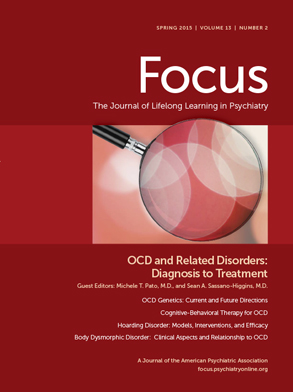Untreated obsessive-compulsive disorder (OCD) is usually a chronic condition, often with waxing and waning symptoms. Spontaneous remission rates tend to be low. Individuals suffering from OCD typically experience a reduced quality of life and high levels of social and occupational impairment. Frequent avoidance of situations that may trigger obsessions and compulsions may restrict activities and social relationships. Additionally, individuals with OCD vary substantially in the degree of insight they have about the accuracy of the beliefs that underlie their obsessive-compulsive symptoms. Those individuals with good or fair insight are the most likely to seek and engage in effective treatment. Individuals with more limited or absent insight are less likely to engage in treatment and are often resistant to efforts to eliminate compulsive behaviors, being convinced that such efforts will end in tragedy (
1,
2). For those patients, considerable clinical acumen is required to foster the collaborative working relationship required for effective treatment. In addition, the excessive doubting that is characteristic of OCD often requires special approaches to building the therapeutic alliance (
3).
Establishing a Therapeutic Alliance
The quality of the doctor-patient alliance has been found to be important in the treatment of many psychiatric disorders (
4–
10). When therapists actively attend to issues of patient engagement and the therapeutic alliance, rates of patient symptom improvement frequently rise, sometimes dramatically (
11). In a study of predictors of symptom improvement in the treatment of OCD using multiple regression analyses, Vogel et al. (
4) found that the quality of the therapeutic alliance was the most important variable—more important even than patient expectancies and motivation for change. The first-line treatment of OCD is generally considered to be cognitive-behavioral therapy with exposure and response prevention (ERP) alone or in combination with selective serotonin reuptake inhibitors (
2,
12). ERP therapy—exposing the patient to that which is feared while preventing the ritualized compulsive response—may be very effective if the treatment regimen is followed. However, fear responses are primal and evoke fight, flight, or, in the case of OCD, a combination of avoidance and ritualized neutralization of the fear. The ERP treatment approach is associated with a high level of discomfort. A great deal of trust is required for an individual with OCD to endure this discomfort and relinquish prior avoidance and ritualized coping mechanisms so as to fully engage in effective treatment (
4,
13).
Enhancing the therapeutic alliance has the potential to improve treatment outcome for patients suffering from OCD. In the context of this disorder, the practitioner should address these issues up front. Explaining the treatment process, listening carefully to and validating the patient’s fears and misgivings, and embarking upon a collaborative treatment plan are methods that assist in fostering a positive alliance (
2).
Clinical Vignette
Ms. Jefferson stopped at the entrance to the psychiatrist’s office and symmetrically touched the sides of the door jamb twice before entering. Dr. Thomas smiled warmly as she greeted her. Ms. Jefferson shook Dr. Thomas’s hand but innocuously removed a bottle of hand sanitizer from her purse and cleansed her hands as she sat down. Dr. Thomas noted that dry skin flaked off of Ms. Jefferson’s otherwise smooth brown skin. This was Ms. Jefferson’s first appointment with a mental health professional, and her worried family members had warned Dr. Thomas that she had been resistant to the appointment. “I think she really believes that she will fall sick and die if she doesn’t keep washing her hands and following her rituals,” her husband explained. “She’s been a clean-freak all along, but this is getting out of control. I can hardly get her to leave the house, and she may lose her teaching job.” He sounded desperate for help. Ms. Jefferson sat rigidly, cleansing her hands as she gazed with a forced smile at Dr. Thomas.
“I’m glad you came,” began Dr. Thomas. “It must be very hard to be here. Your husband said that you are fearful that you or a family member will become very ill if you don’t wash and follow your rituals. Yet, you kept the appointment,” Dr. Thomas observed.
There was a long pause before Ms. Jefferson spoke. “I suppose on some level I know that my kids, husband, and I probably won’t die if I don’t continually wash. But it doesn’t seem worth the risk. I came because my husband and children really wanted me to.”
Dr. Thomas smiled and asked about Ms. Jefferson’s family, her job, her family of origin and upbringing, and her understanding of her OCD symptoms. “My husband and kids complain that I am a control freak,” Ms. Jefferson ended her narrative. “But if I’m not in control, I won’t come here.”
“Perfect!” Dr. Thomas retorted, having chosen the word carefully. “The more in control you feel, the better the treatment will work. So, it seems like a great match.”
Ms. Jefferson noted that she wanted to know what the treatment would be, what would happen if she did not agree, how she would communicate with Dr. Thomas if there were problems, and if medications were involved. She wanted to read the literature on the treatments. She wanted time to consider her options before deciding. She didn’t want to feel pressured or rushed. She didn’t want to be mocked or ridiculed for her rituals and what she termed her “bad thoughts.”
Dr. Thomas gazed at Ms. Jefferson empathically. “Wow, it really was hard for you to come here. I’ll tell you what. I will print out some information about OCD and its treatment. You might find this web site helpful as well. If you come to your appointment weekly, we can craft a plan together. No ridicule. No tricks.”
For the first time since she had entered the office, Ms. Jefferson flashed a genuine smile. “I would have you do a ‘pinky swear,’ about that, but then I would have to wash my hands again,” she remarked, almost playfully.
Dr. Thomas smiled back appreciatively. “See you next week.”

